2019年春外研版高中英语必修四Module 3 Body Language and Non-Verbal Communication Introduction & Reading and Vocab
文档属性
| 名称 | 2019年春外研版高中英语必修四Module 3 Body Language and Non-Verbal Communication Introduction & Reading and Vocab | 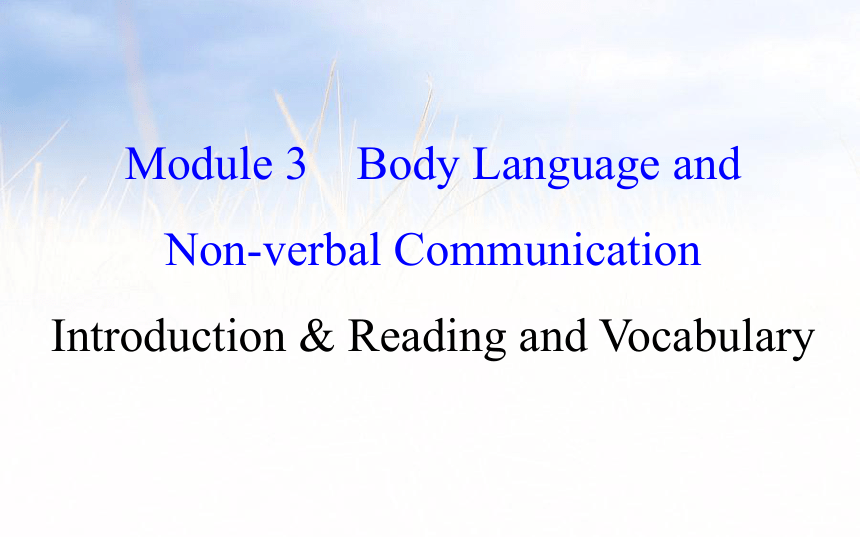 | |
| 格式 | zip | ||
| 文件大小 | 857.8KB | ||
| 资源类型 | 教案 | ||
| 版本资源 | 外研版 | ||
| 科目 | 英语 | ||
| 更新时间 | 2019-04-20 17:51:56 | ||
图片预览


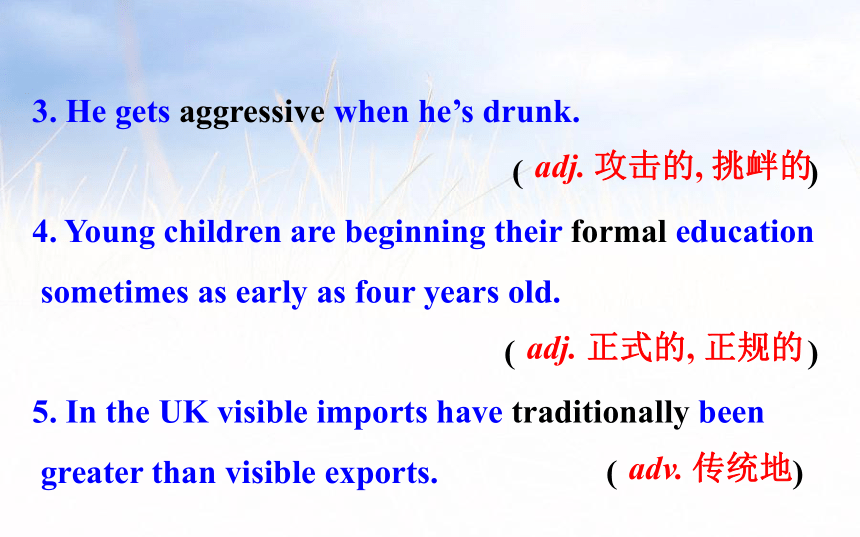

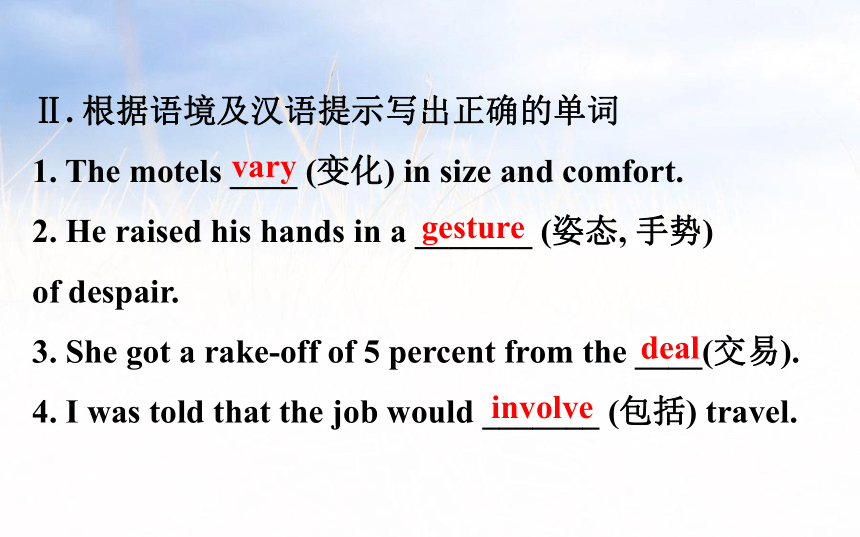
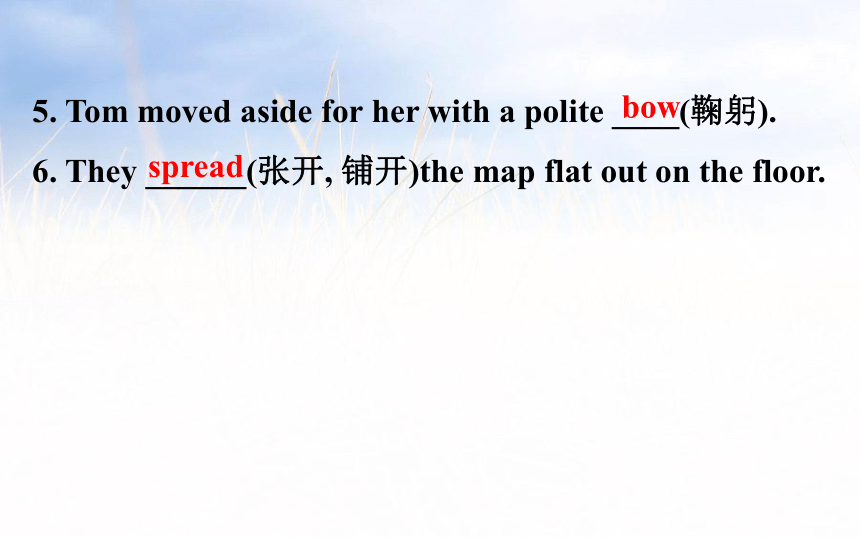
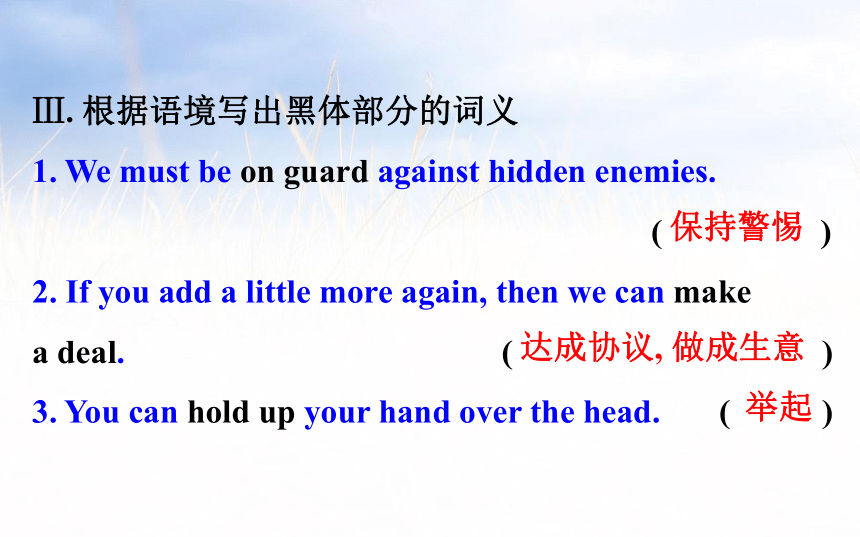
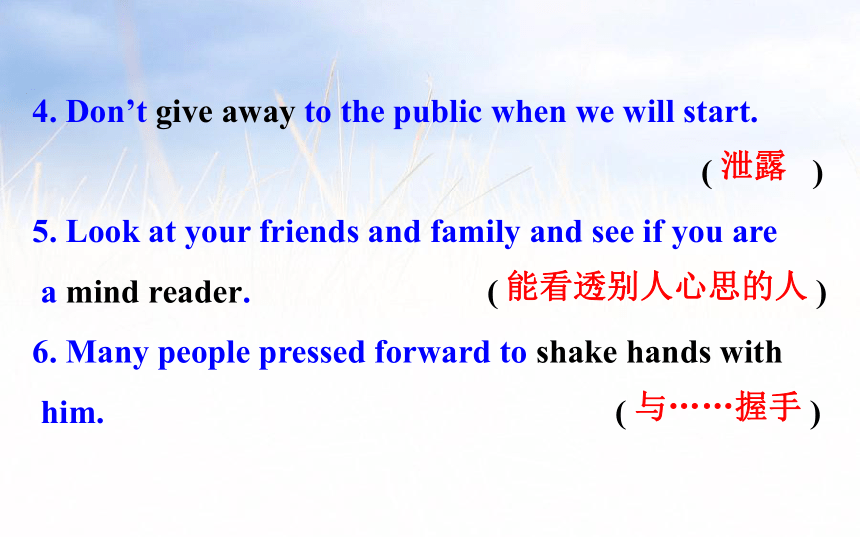
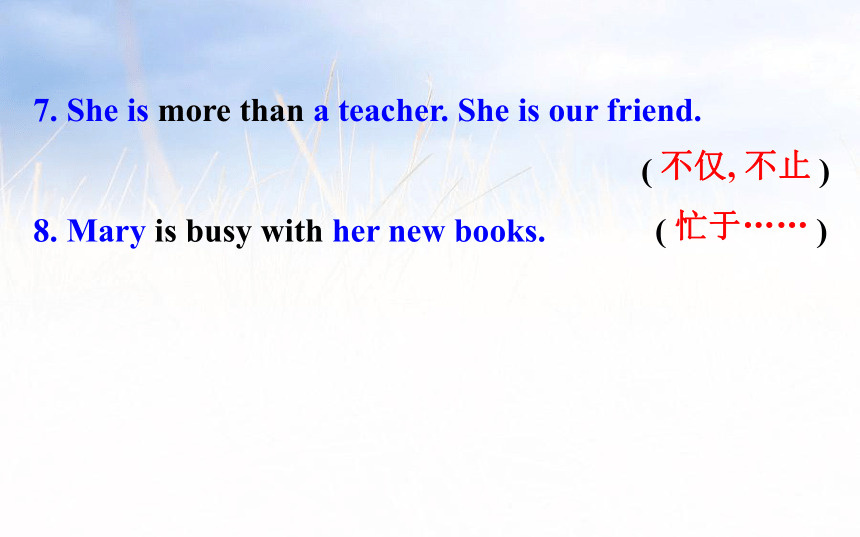
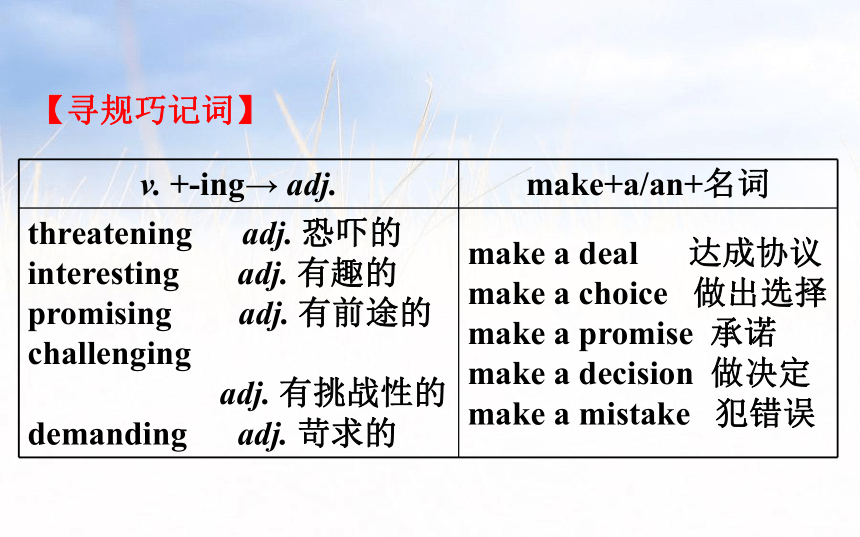
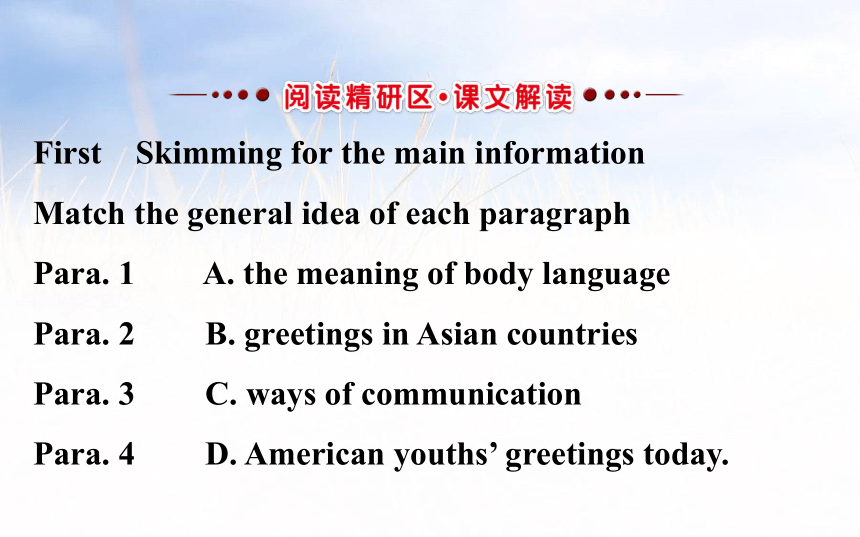
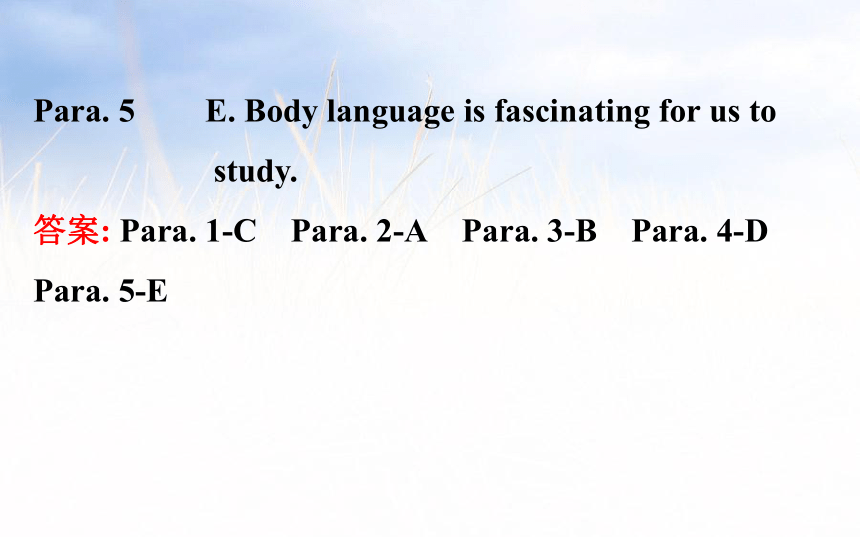
文档简介
课件81张PPT。Module 3 Body Language and
Non-verbal Communication
Introduction & Reading and VocabularyⅠ. 根据语境写出黑体部分的词性及词义
1. Language is an instrument for communication.
( )
2. This wounded soldier was unconscious from his
loss of blood.
( )n. 交流, 沟通adj. 失去知觉的, 无意识的3. He gets aggressive when he’s drunk.
( )
4. Young children are beginning their formal education
sometimes as early as four years old.
( )
5. In the UK visible imports have traditionally been
greater than visible exports. ( )adj. 攻击的, 挑衅的adj. 正式的, 正规的adv. 传统地6. Larry admitted using threatening behavior.
( )adj. 恐吓的Ⅱ. 根据语境及汉语提示写出正确的单词
1. The motels ____ (变化) in size and comfort.
2. He raised his hands in a _______ (姿态, 手势)
of despair.
3. She got a rake-off of 5 percent from the ____(交易).
4. I was told that the job would _______ (包括) travel. varygesturedealinvolve5. Tom moved aside for her with a polite ____(鞠躬).
6. They ______(张开, 铺开)the map flat out on the floor. bowspreadⅢ. 根据语境写出黑体部分的词义
We must be on guard against hidden enemies.
( )
2. If you add a little more again, then we can make
a deal. ( )
3. You can hold up your hand over the head. ( )保持警惕达成协议, 做成生意举起4. Don’t give away to the public when we will start.
( )
5. Look at your friends and family and see if you are
a mind reader. ( )
6. Many people pressed forward to shake hands with
him. ( )泄露能看透别人心思的人与……握手7. She is more than a teacher. She is our friend.
( )
8. Mary is busy with her new books. ( )不仅, 不止忙于……【寻规巧记词】First Skimming for the main information
Match the general idea of each paragraph
Para. 1 A. the meaning of body language
Para. 2 B. greetings in Asian countries
Para. 3 C. ways of communication
Para. 4 D. American youths’ greetings today. Para. 5 E. Body language is fascinating for us to
study.
答案: Para. 1-C Para. 2-A Para. 3-B Para. 4-D
Para. 5-ESecond Scanning for detailed information
What does the word “communication” mean in the
passage?
Words and sentences.
B. Unconscious body language.
C. “Learned” body language.
D. All of the above. 2. “Shaking hands” means all of the following
EXCEPT that______.
A. we agree and we trust each other
B. we are not aggressive
C. we respect each other
D. our right hands are the strongest3. Which of the following statements is NOT true?
Giving a “salaam” is a kind of “learned” body
language.
B. A “high five” is a formal style of greeting.
C. When we make a deal we shake hands.
D. In Asia, touching each other when people meet isn’t
a common greeting. 4. Which of the following is the closest in meaning to
the phrase “give away” in the last paragraph?
Give sb. sth. for free.
B. Throw away.
C. Give up.
D. Make sth. known to sb. . 5. What’s the author’s purpose of writing the passage?
A. To teach us how to greet others.
B. To advise us to use “learned” body language.
C. To offer us some information about “learned”
body language.
D. To let us know why we shake hands when we meet. Third Intensive reading to finish the passage
We use both words and 1. _____________to
express our thoughts and opinions and to
2. ________________other people. Just like spoken
language, body language 3. ______from culture to
culture. body languagecommunicate withvaries Every culture has developed a formal way to
4. _____ strangers. Traditionally, Europeans and
Americans 5. ___________. They do this with the right
hand. That means I trust you. I’m not carrying a
6.___________ weapon.
Greetings in Asian countries do not 7. _______
touching the other person, but they always involve thegreetshake hands threateninginvolve hands.
Today American 8._______ often greet each other
with the expression, “Give me five! ”Body language is
fascinating for anyone to study. People 9. _________
much more by their 10. _______ than by their words. youthsgive awaygestures 【阅读素养提升】
How do people communicate with each other? (List at
least three kinds of communication. )
________________________________________
_________________________________________
______________________________________________
______________________________________________
_________Generally speaking, people communicate witheach other in the following ways. One is spokenlanguage, the other is written language, and the last isbody language (facial expressions, hand gestures and posture). 【精读难句透析】
We see examples of unconscious body language very
often, yet there is also “learned” body language, which
varies from culture to culture.
分析: 该句是主从复合句。which varies from culture
to culture是非限制性定语从句修饰_____________。
其中, ___在此处表示转折。body languageyet译文: 我们经常看到无意识的身势语, 但也有“习得”的身势语, 它在不同的文化中各不相同。1. vary vi. 变化, 相异, 不同; vt. 改变, 变更
【语境领悟】
*(2016·浙江高考)The effects of gossip vary depending
on the situation.
闲话的影响因情况的不同而不一样。*Though on the same family, the bird varies in size and color.
虽属同科, 这种鸟大小、颜色不一。
*(2017·浙江高考)They discussed various matters all over the world in the library.
他们在图书馆讨论世界上发生的各种事情。【归纳拓展】
(1)vary from. . . to. . . 从……到……之间变化
vary in 在……方面不同/有变化
vary with 随着……而变化
(2)various adj. (一般用于名词前作
定语)各种各样的【即学活用】
语法填空。
(1)As they’re handmade, each one ______ (vary) slightly.
(2)The planning laws vary _____ state to state.
世纪金榜导学号89424028
(3)There are _______ (vary) ways to answer your
question. variesfromvarious(4)Rooms vary __ size but all have a television and
a telephone. in【拓展训练】
①The flowers _______color and size, but all of them
are beautiful.
这些花的颜色和大小都不相同, 但都很漂亮。
②The charge for a room in this hotel ______
____________ $20 ______ $30.
这家宾馆每个房间的费用由20美元到30美元不等。vary invariesbetween/fromand/to③Generally speaking, prices of fruit and vegetables
__________________.
一般来说, 水果和蔬菜的价格随季节变化而变化。 vary with the season2. involve vt. 包括, 涉及, 参与
【语境领悟】
*Greetings in Asian countries do not involve touching the other person, but they always involve the hands.
在亚洲国家打招呼是不接触别人身体的, 但总是会接触到手。*Don’t involve other people in your trouble.
别把别人牵涉进你的麻烦中去。
*(2017·江苏高考)For a long time Gabriel didn’t want to be involved in music at all.
很长一段时间, Gabriel一点也不热衷于音乐。【归纳拓展】
(1)involve doing sth. 包括做某事; 需要做某事
involve sb. in (doing) sth. 使某人参与(做)某事, 使
人牵扯到某事中(2)involved adj. 复杂的; 有牵连的; 有关的
get/be involved in 被卷入……之中; 热衷于; 专心
于
get/be involved with sb. /sth.
与某人混在一起; 和……有密
切联系【名师点津】involved的位置决定意思
involved作前置定语时, 意为“复杂的”, 作后置定语时, 意为“涉及的”。
*His new story has the involved plot. (前置定语)
他新写的这本小说有复杂的情节。*We’ll make our decision and contact the people
involved. (后置定语)
我们将做出决定, 然后与有关人员联系。【知识延伸】“be+过去分词+in”短语
be interested in对……感兴趣; be buried in埋头于; be lost in沉湎于; be dressed in穿着等。
【熟词生义】
The job involves me travelling all over the country.
这份工作需要我在全国各地跑。( )vt. 需要【即学活用】
语法填空。
(1)Reading is a very complicated skill ________
(involve) many aspects. 世纪金榜导学号89424029
(2)Parents should involve themselves __ their children’s
education.
involvingin(3)That will involve _____ (live) apart from my family.
(4)Several football officials were involved __ the matter.livingin3. hold up 举起; 延误; 抢劫; 举……作为范例
【语境领悟】
*My husband has lost so much weight that he has to wear a belt to hold his trousers up.
我丈夫体重减了好多, 他只好用一根皮带把裤子提起来。*He was able to hold back his anger and avoid a fight.
他忍住了怒气, 避免了一场殴斗。
*They were ready to hold out a friendly hand.
他们准备伸出友谊之手。【归纳拓展】
hold back 阻止; 抑制(情感、情绪等); 隐瞒
hold on (打电话)等一下, 别挂断; 坚持住
hold out 伸出; 维持
hold on to 抓紧, 不放手; 坚持【即学活用】
用适当的hold短语填空。
(1)When he left the telephone to find a pencil, he asked
me to _______.
(2)Hearing the bad news, I couldn’t _________my tears. hold onhold back(3)Don’t _________________on time. He is often
_______in a traffic.
别指望他准时到。他经常因交通堵塞而耽搁。rely on him to comeheld up4. give away 暴露(自己的情况), 泄露(秘密), 捐献, 颁发
【语境领悟】
*People give away much more by their gestures than by their words.
人们通过姿势表露的意思要比通过话语表露的意思更多。*If you don’t shower more often, your body will give off an unpleasant odor.
如果你不经常淋浴, 你的身体就会散发出一股难闻的味道。*(2017·全国卷Ⅲ)Her father Peter, 44, wants her to give up school to model full-time.
她44岁的父亲彼得想让她放弃学业做全职模特。【归纳拓展】
give back 归还; 送回; 使恢复
give in 屈服, 投降, 退让
give off 发出(气味、光、热、声音等)
give out 用完, 用尽; 分发; 发出, 放出
give up 放弃; 不再做(某事)【即学活用】
用适当的副词填空。
(1)She’s not giving _____ anything he told her.
(2)(2016·四川高考)If you don’t want to read it, give it
_____. 世纪金榜导学号89424030
(3)I wasn’t going to give __. I wasn’t going to fall.
(4)The children gave ___ flowers to the soldiers. awaybackinout【拓展训练】用give适当的短语填空。
①—Smoking is bad for your health.
—Yes, I know. But I can’t simply ________.
②Her face _____________when she told a lie.
③Both sides argued with reason, and neither would
______. give it upgave her awaygive in④In those days, he used to _________a part of his
income to help his friend.
⑤If they are burned, they will __________poisonous
gases.
⑥Both the man and the horse ________after the long
ride. give awaygive off/outgave out⑦Please _________the books to me when you finish
reading them. give back5. One person then holds up his hand, palm outwards and five fingers spread.
然后一个人举起手, 手心向外, 五指张开。
【句型剖析】
(1)本句是一个简单句。句中画线部分是独立主格结构。(2)独立主格结构一般在句子中作定语或状语。它不是一个完整的句子, 其构成常有以下几种情况: 【语境领悟】
*The project completed, he went to sleep.
工程完工了, 他去睡觉了。
*Mary was doing her homework, lights burning.
灯亮着, 玛丽在做家庭作业。*An important lecture to be given tomorrow, the professor has to stay up late into the night.
因为明天要发表一个重要的演讲, 教授不得不熬夜到很晚。
*Father came back home happily, cake in hand.
爸爸高兴地回家去, 手里拿着蛋糕。【名师点津】独立主格的四注意
(1)独立主格结构中名词/代词为结构的逻辑主语, 故代词须用主格形式。
(2)当独立主格结构为“名词+介词+名词”时, 特别是作伴随状语时, 名词前可以不加冠词或形容词性物主代词, 名词也不用复数形式, 如book in hand。(3)作状语的独立主格结构可用with复合结构替换。但替换“名词+介词+名词”类独立主格结构时, 名词前须加冠词或形容词性物主代词, 名词可用复数形式。如book in hand可变成with a book in his hand。
(4)there be句型的独立主格结构为there being。【即学活用】
句型转换。
(1)When the test was finished, we began our holiday.
→_______________, we began our holiday.
(2)If time permits, we will visit you tomorrow.
→_______________, we will visit you tomorrow. The test finishedTime permitting(3)Because there was no bus, we had to go home on foot.
→_________________, we had to go home on foot.
(4)We watched the men playing in the air with our
hearts in our mouths.
→We watched the men playing in the air, ____________
__________. 世纪金榜导学号89424031There being no busour hearts inour mouths【拓展训练】
(1) ______________, we should have done the job much
better.
如果给我们更多的时间, 我们应该就已经把工作做得更
好了。
(2)He was waiting, __________________.
他在等着, 眼睛望着她的背影。More time givenhis eyes on her back(3) _______________________, we had no trouble
getting out of the forest.
由于有向导领路, 我们毫不费劲地走出了森林。
(4)Two hundred people died in the accident, _______
____________.
两百人死于事故, 其中有许多儿童。The guide leading the waymany ofthem children【要点拾遗】
1. communicate vi. (用语言、信号)传递信息; 交流
【语境领悟】
*Parents should communicate with children to increase understanding each other.
家长和孩子应该交流以增加相互间的理解。*Did she communicate my wishes to you?
她有没有把我的祝福转告给你?
*Radio is the only means of communication in remote areas.
边远地区唯一的通讯工具就是无线电。
*I am in communication with him on this subject.
关于这问题, 我正和他交换意见。【归纳拓展】
(1)communicate with sb. 与某人联络
communicate sth. to sb. 传达(思想、感情等)给某人
(2)communication n. 交流; 沟通; 通信, 通信手
段; 交通
be in communication with sb.
与某人保持联络/交流【即学活用】
单句语法填空
(1)We can now communicate immediately ____ people
on the other side of the world.
(2)Has the news been _____________ (communicate) to
the students yet? withcommunicated(3)There is very little ______________ (communicate)
between them even though they have been married for
ten years. communication2. make a deal (=do a deal) 达成协议; 做成交易
【语境领悟】
* I’ll make a deal with you—you wash the car and I’ll
let you use it tonight. 我和你做个交易——你洗车,
今晚我让你用它。
*We’ve made a deal with Germany on wine imports.
关于红酒进口我们和德国达成了协议。*The boy felt a great deal better after eating a great deal of food. 那个男孩吃了许多食物后感觉好多了。
*The book deals with how to make a deal with Americans.
本书论述了怎样与美国人做成交易。【归纳拓展】
(1)make a deal with sb. on. . .
关于……和某人达成协议
a great deal 许多; ……得多(修饰比较级)
a great deal of 许多(修饰不可数名词)
(2)deal with 处理【即学活用】
用deal短语的适当形式填空。
(1)You’re not going to get out of here unless we _______
_____.
除非我们达成协议, 否则你就别想从这儿出去。make a deal(2)You should thank me for saving you ____________
_____.
你应该感谢我为你节约了许多时间。
(3)Her poems often ________the subject of death.
她的诗通常是关于死亡这一主题的。a good deal of timedeal with3. Body language is fascinating for anyone to study.
对于任何人来说, 学习身势语都是很有趣的。
【句型剖析】
(1)此句是一个简单句, 属于“主语(人/物)+be+ adj. +to
do”结构。常用其一般式即to do结构, 而不用to have
done或to be doing结构。动词不定式只能用主动形式,
动词不定式中的动词如果是不及物动词, 要带适当的介词。
(2)通常, 此结构可以变成“形式主语it+be+ adj. +动词不定式”。【语境领悟】
*We all think Horton, an Australian sporter, is difficult to deal with.
我们都认为澳大利亚运动员霍顿是个很难相处的家伙。*The information is hard to get.
=It’s hard to get the information.
这些信息很难得到。
*The problem is easy to deal with.
=It is easy to deal with the problem.
这个问题很容易处理。【知识延伸】“人/物+be+ adj. +动词不定式”的升级
“人/物+be+ adj. +动词不定式”的升级版就是把其用到“find/make +人/物+ adj. +动词不定式”中。例如: They find the girl hard to get along with. 他们发现那个女孩难以相处。
They made the We Chat easier to use than QQ.
他们使得微信比QQ用起来更方便。【即学活用】
单句改错。
(1)The bed is comfortable to lie. ( )
(2)The joke is interested to read.
( )
(3)The big forest fire is difficult to be put out.
( )lie后面加ininterested →interesting去掉be
Non-verbal Communication
Introduction & Reading and VocabularyⅠ. 根据语境写出黑体部分的词性及词义
1. Language is an instrument for communication.
( )
2. This wounded soldier was unconscious from his
loss of blood.
( )n. 交流, 沟通adj. 失去知觉的, 无意识的3. He gets aggressive when he’s drunk.
( )
4. Young children are beginning their formal education
sometimes as early as four years old.
( )
5. In the UK visible imports have traditionally been
greater than visible exports. ( )adj. 攻击的, 挑衅的adj. 正式的, 正规的adv. 传统地6. Larry admitted using threatening behavior.
( )adj. 恐吓的Ⅱ. 根据语境及汉语提示写出正确的单词
1. The motels ____ (变化) in size and comfort.
2. He raised his hands in a _______ (姿态, 手势)
of despair.
3. She got a rake-off of 5 percent from the ____(交易).
4. I was told that the job would _______ (包括) travel. varygesturedealinvolve5. Tom moved aside for her with a polite ____(鞠躬).
6. They ______(张开, 铺开)the map flat out on the floor. bowspreadⅢ. 根据语境写出黑体部分的词义
We must be on guard against hidden enemies.
( )
2. If you add a little more again, then we can make
a deal. ( )
3. You can hold up your hand over the head. ( )保持警惕达成协议, 做成生意举起4. Don’t give away to the public when we will start.
( )
5. Look at your friends and family and see if you are
a mind reader. ( )
6. Many people pressed forward to shake hands with
him. ( )泄露能看透别人心思的人与……握手7. She is more than a teacher. She is our friend.
( )
8. Mary is busy with her new books. ( )不仅, 不止忙于……【寻规巧记词】First Skimming for the main information
Match the general idea of each paragraph
Para. 1 A. the meaning of body language
Para. 2 B. greetings in Asian countries
Para. 3 C. ways of communication
Para. 4 D. American youths’ greetings today. Para. 5 E. Body language is fascinating for us to
study.
答案: Para. 1-C Para. 2-A Para. 3-B Para. 4-D
Para. 5-ESecond Scanning for detailed information
What does the word “communication” mean in the
passage?
Words and sentences.
B. Unconscious body language.
C. “Learned” body language.
D. All of the above. 2. “Shaking hands” means all of the following
EXCEPT that______.
A. we agree and we trust each other
B. we are not aggressive
C. we respect each other
D. our right hands are the strongest3. Which of the following statements is NOT true?
Giving a “salaam” is a kind of “learned” body
language.
B. A “high five” is a formal style of greeting.
C. When we make a deal we shake hands.
D. In Asia, touching each other when people meet isn’t
a common greeting. 4. Which of the following is the closest in meaning to
the phrase “give away” in the last paragraph?
Give sb. sth. for free.
B. Throw away.
C. Give up.
D. Make sth. known to sb. . 5. What’s the author’s purpose of writing the passage?
A. To teach us how to greet others.
B. To advise us to use “learned” body language.
C. To offer us some information about “learned”
body language.
D. To let us know why we shake hands when we meet. Third Intensive reading to finish the passage
We use both words and 1. _____________to
express our thoughts and opinions and to
2. ________________other people. Just like spoken
language, body language 3. ______from culture to
culture. body languagecommunicate withvaries Every culture has developed a formal way to
4. _____ strangers. Traditionally, Europeans and
Americans 5. ___________. They do this with the right
hand. That means I trust you. I’m not carrying a
6.___________ weapon.
Greetings in Asian countries do not 7. _______
touching the other person, but they always involve thegreetshake hands threateninginvolve hands.
Today American 8._______ often greet each other
with the expression, “Give me five! ”Body language is
fascinating for anyone to study. People 9. _________
much more by their 10. _______ than by their words. youthsgive awaygestures 【阅读素养提升】
How do people communicate with each other? (List at
least three kinds of communication. )
________________________________________
_________________________________________
______________________________________________
______________________________________________
_________Generally speaking, people communicate witheach other in the following ways. One is spokenlanguage, the other is written language, and the last isbody language (facial expressions, hand gestures and posture). 【精读难句透析】
We see examples of unconscious body language very
often, yet there is also “learned” body language, which
varies from culture to culture.
分析: 该句是主从复合句。which varies from culture
to culture是非限制性定语从句修饰_____________。
其中, ___在此处表示转折。body languageyet译文: 我们经常看到无意识的身势语, 但也有“习得”的身势语, 它在不同的文化中各不相同。1. vary vi. 变化, 相异, 不同; vt. 改变, 变更
【语境领悟】
*(2016·浙江高考)The effects of gossip vary depending
on the situation.
闲话的影响因情况的不同而不一样。*Though on the same family, the bird varies in size and color.
虽属同科, 这种鸟大小、颜色不一。
*(2017·浙江高考)They discussed various matters all over the world in the library.
他们在图书馆讨论世界上发生的各种事情。【归纳拓展】
(1)vary from. . . to. . . 从……到……之间变化
vary in 在……方面不同/有变化
vary with 随着……而变化
(2)various adj. (一般用于名词前作
定语)各种各样的【即学活用】
语法填空。
(1)As they’re handmade, each one ______ (vary) slightly.
(2)The planning laws vary _____ state to state.
世纪金榜导学号89424028
(3)There are _______ (vary) ways to answer your
question. variesfromvarious(4)Rooms vary __ size but all have a television and
a telephone. in【拓展训练】
①The flowers _______color and size, but all of them
are beautiful.
这些花的颜色和大小都不相同, 但都很漂亮。
②The charge for a room in this hotel ______
____________ $20 ______ $30.
这家宾馆每个房间的费用由20美元到30美元不等。vary invariesbetween/fromand/to③Generally speaking, prices of fruit and vegetables
__________________.
一般来说, 水果和蔬菜的价格随季节变化而变化。 vary with the season2. involve vt. 包括, 涉及, 参与
【语境领悟】
*Greetings in Asian countries do not involve touching the other person, but they always involve the hands.
在亚洲国家打招呼是不接触别人身体的, 但总是会接触到手。*Don’t involve other people in your trouble.
别把别人牵涉进你的麻烦中去。
*(2017·江苏高考)For a long time Gabriel didn’t want to be involved in music at all.
很长一段时间, Gabriel一点也不热衷于音乐。【归纳拓展】
(1)involve doing sth. 包括做某事; 需要做某事
involve sb. in (doing) sth. 使某人参与(做)某事, 使
人牵扯到某事中(2)involved adj. 复杂的; 有牵连的; 有关的
get/be involved in 被卷入……之中; 热衷于; 专心
于
get/be involved with sb. /sth.
与某人混在一起; 和……有密
切联系【名师点津】involved的位置决定意思
involved作前置定语时, 意为“复杂的”, 作后置定语时, 意为“涉及的”。
*His new story has the involved plot. (前置定语)
他新写的这本小说有复杂的情节。*We’ll make our decision and contact the people
involved. (后置定语)
我们将做出决定, 然后与有关人员联系。【知识延伸】“be+过去分词+in”短语
be interested in对……感兴趣; be buried in埋头于; be lost in沉湎于; be dressed in穿着等。
【熟词生义】
The job involves me travelling all over the country.
这份工作需要我在全国各地跑。( )vt. 需要【即学活用】
语法填空。
(1)Reading is a very complicated skill ________
(involve) many aspects. 世纪金榜导学号89424029
(2)Parents should involve themselves __ their children’s
education.
involvingin(3)That will involve _____ (live) apart from my family.
(4)Several football officials were involved __ the matter.livingin3. hold up 举起; 延误; 抢劫; 举……作为范例
【语境领悟】
*My husband has lost so much weight that he has to wear a belt to hold his trousers up.
我丈夫体重减了好多, 他只好用一根皮带把裤子提起来。*He was able to hold back his anger and avoid a fight.
他忍住了怒气, 避免了一场殴斗。
*They were ready to hold out a friendly hand.
他们准备伸出友谊之手。【归纳拓展】
hold back 阻止; 抑制(情感、情绪等); 隐瞒
hold on (打电话)等一下, 别挂断; 坚持住
hold out 伸出; 维持
hold on to 抓紧, 不放手; 坚持【即学活用】
用适当的hold短语填空。
(1)When he left the telephone to find a pencil, he asked
me to _______.
(2)Hearing the bad news, I couldn’t _________my tears. hold onhold back(3)Don’t _________________on time. He is often
_______in a traffic.
别指望他准时到。他经常因交通堵塞而耽搁。rely on him to comeheld up4. give away 暴露(自己的情况), 泄露(秘密), 捐献, 颁发
【语境领悟】
*People give away much more by their gestures than by their words.
人们通过姿势表露的意思要比通过话语表露的意思更多。*If you don’t shower more often, your body will give off an unpleasant odor.
如果你不经常淋浴, 你的身体就会散发出一股难闻的味道。*(2017·全国卷Ⅲ)Her father Peter, 44, wants her to give up school to model full-time.
她44岁的父亲彼得想让她放弃学业做全职模特。【归纳拓展】
give back 归还; 送回; 使恢复
give in 屈服, 投降, 退让
give off 发出(气味、光、热、声音等)
give out 用完, 用尽; 分发; 发出, 放出
give up 放弃; 不再做(某事)【即学活用】
用适当的副词填空。
(1)She’s not giving _____ anything he told her.
(2)(2016·四川高考)If you don’t want to read it, give it
_____. 世纪金榜导学号89424030
(3)I wasn’t going to give __. I wasn’t going to fall.
(4)The children gave ___ flowers to the soldiers. awaybackinout【拓展训练】用give适当的短语填空。
①—Smoking is bad for your health.
—Yes, I know. But I can’t simply ________.
②Her face _____________when she told a lie.
③Both sides argued with reason, and neither would
______. give it upgave her awaygive in④In those days, he used to _________a part of his
income to help his friend.
⑤If they are burned, they will __________poisonous
gases.
⑥Both the man and the horse ________after the long
ride. give awaygive off/outgave out⑦Please _________the books to me when you finish
reading them. give back5. One person then holds up his hand, palm outwards and five fingers spread.
然后一个人举起手, 手心向外, 五指张开。
【句型剖析】
(1)本句是一个简单句。句中画线部分是独立主格结构。(2)独立主格结构一般在句子中作定语或状语。它不是一个完整的句子, 其构成常有以下几种情况: 【语境领悟】
*The project completed, he went to sleep.
工程完工了, 他去睡觉了。
*Mary was doing her homework, lights burning.
灯亮着, 玛丽在做家庭作业。*An important lecture to be given tomorrow, the professor has to stay up late into the night.
因为明天要发表一个重要的演讲, 教授不得不熬夜到很晚。
*Father came back home happily, cake in hand.
爸爸高兴地回家去, 手里拿着蛋糕。【名师点津】独立主格的四注意
(1)独立主格结构中名词/代词为结构的逻辑主语, 故代词须用主格形式。
(2)当独立主格结构为“名词+介词+名词”时, 特别是作伴随状语时, 名词前可以不加冠词或形容词性物主代词, 名词也不用复数形式, 如book in hand。(3)作状语的独立主格结构可用with复合结构替换。但替换“名词+介词+名词”类独立主格结构时, 名词前须加冠词或形容词性物主代词, 名词可用复数形式。如book in hand可变成with a book in his hand。
(4)there be句型的独立主格结构为there being。【即学活用】
句型转换。
(1)When the test was finished, we began our holiday.
→_______________, we began our holiday.
(2)If time permits, we will visit you tomorrow.
→_______________, we will visit you tomorrow. The test finishedTime permitting(3)Because there was no bus, we had to go home on foot.
→_________________, we had to go home on foot.
(4)We watched the men playing in the air with our
hearts in our mouths.
→We watched the men playing in the air, ____________
__________. 世纪金榜导学号89424031There being no busour hearts inour mouths【拓展训练】
(1) ______________, we should have done the job much
better.
如果给我们更多的时间, 我们应该就已经把工作做得更
好了。
(2)He was waiting, __________________.
他在等着, 眼睛望着她的背影。More time givenhis eyes on her back(3) _______________________, we had no trouble
getting out of the forest.
由于有向导领路, 我们毫不费劲地走出了森林。
(4)Two hundred people died in the accident, _______
____________.
两百人死于事故, 其中有许多儿童。The guide leading the waymany ofthem children【要点拾遗】
1. communicate vi. (用语言、信号)传递信息; 交流
【语境领悟】
*Parents should communicate with children to increase understanding each other.
家长和孩子应该交流以增加相互间的理解。*Did she communicate my wishes to you?
她有没有把我的祝福转告给你?
*Radio is the only means of communication in remote areas.
边远地区唯一的通讯工具就是无线电。
*I am in communication with him on this subject.
关于这问题, 我正和他交换意见。【归纳拓展】
(1)communicate with sb. 与某人联络
communicate sth. to sb. 传达(思想、感情等)给某人
(2)communication n. 交流; 沟通; 通信, 通信手
段; 交通
be in communication with sb.
与某人保持联络/交流【即学活用】
单句语法填空
(1)We can now communicate immediately ____ people
on the other side of the world.
(2)Has the news been _____________ (communicate) to
the students yet? withcommunicated(3)There is very little ______________ (communicate)
between them even though they have been married for
ten years. communication2. make a deal (=do a deal) 达成协议; 做成交易
【语境领悟】
* I’ll make a deal with you—you wash the car and I’ll
let you use it tonight. 我和你做个交易——你洗车,
今晚我让你用它。
*We’ve made a deal with Germany on wine imports.
关于红酒进口我们和德国达成了协议。*The boy felt a great deal better after eating a great deal of food. 那个男孩吃了许多食物后感觉好多了。
*The book deals with how to make a deal with Americans.
本书论述了怎样与美国人做成交易。【归纳拓展】
(1)make a deal with sb. on. . .
关于……和某人达成协议
a great deal 许多; ……得多(修饰比较级)
a great deal of 许多(修饰不可数名词)
(2)deal with 处理【即学活用】
用deal短语的适当形式填空。
(1)You’re not going to get out of here unless we _______
_____.
除非我们达成协议, 否则你就别想从这儿出去。make a deal(2)You should thank me for saving you ____________
_____.
你应该感谢我为你节约了许多时间。
(3)Her poems often ________the subject of death.
她的诗通常是关于死亡这一主题的。a good deal of timedeal with3. Body language is fascinating for anyone to study.
对于任何人来说, 学习身势语都是很有趣的。
【句型剖析】
(1)此句是一个简单句, 属于“主语(人/物)+be+ adj. +to
do”结构。常用其一般式即to do结构, 而不用to have
done或to be doing结构。动词不定式只能用主动形式,
动词不定式中的动词如果是不及物动词, 要带适当的介词。
(2)通常, 此结构可以变成“形式主语it+be+ adj. +动词不定式”。【语境领悟】
*We all think Horton, an Australian sporter, is difficult to deal with.
我们都认为澳大利亚运动员霍顿是个很难相处的家伙。*The information is hard to get.
=It’s hard to get the information.
这些信息很难得到。
*The problem is easy to deal with.
=It is easy to deal with the problem.
这个问题很容易处理。【知识延伸】“人/物+be+ adj. +动词不定式”的升级
“人/物+be+ adj. +动词不定式”的升级版就是把其用到“find/make +人/物+ adj. +动词不定式”中。例如: They find the girl hard to get along with. 他们发现那个女孩难以相处。
They made the We Chat easier to use than QQ.
他们使得微信比QQ用起来更方便。【即学活用】
单句改错。
(1)The bed is comfortable to lie. ( )
(2)The joke is interested to read.
( )
(3)The big forest fire is difficult to be put out.
( )lie后面加ininterested →interesting去掉be
